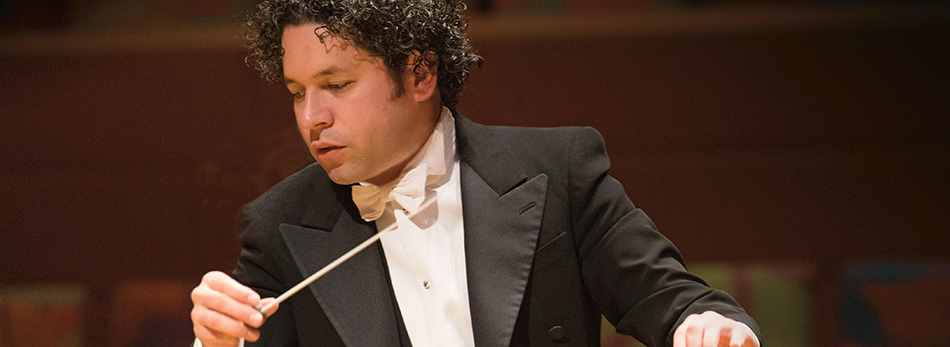
MUSIC GOING STRAIGHT TO THE HEART
LOS ANGELES—A symphony concert by Dudamel & Co. is not an event; it is an experience.
Music Director Gustavo Dudamel is transported to another world in conducting his Los Angeles Philharmonic. With a work like Prokofiev’s “Romeo and Juliet” (the suite), he is animated and as if in a psychedelic trance during the music, the whole score in memory, and faithfully giving visual cues to the players in unsurpassed efficiency. At the end, 10 seconds of rapt silence before he allows the applause. And then he steps OFF the podium (when was the last time you saw that?) and stands amongst his players, rushing offstage shortly after, as if still in that Old World somewhere between England’s Shakespeare and Russian ballet. His facial expressions, for those of us who could see them, reflect moments between entrancement and rapture.
The Dudamel experience has been fulfilling the audiences here for eight years and continues unabated. The same dedication marked his entire program, partly Russian, partly Shakespearean, all done by memory, with no score in sight.
Add to this impact the resonant acoustics of the 2265-seat (Frank Gehry) Disney Symphony Hall, where the sound of a fortissimo lingers endearingly in the air for a couple of seconds, as if caressing your ear—well, you have a real experience.
The Shakespearean theme was further carried forward that day (Feb. 3) with “(K)ein Sommernachtstraum:” A, or No, Midsummer Nights’s Dream, depending on the parentheses, written by Alfred Schnittke in 1985. Along with Sofia Gubaidulina, Schnittke was among the most prominent of the post-Shostakovich Soviet composers and, like her, he emigrated later on to Germany (thus the German title). He was among the most eclectic of composers, like a painter with 40 paint-pots, all of which he wants to put to use for one work. The backbone here is a dinky lullaby in waltz time which goes awry. He has rude low-brass interjections, offset against high tinkles of harpsichord, like an orchestra singing falsetto. The sound runs ever madder, and the flute enters out of sync. In the end, it’s Schnittke at his most irreverent AND most comic, with his satire running to an orgy of percussion, then a dance-band beat. This is the closest thing to sonic insanity, recalling Mozart’s “A Musical Joke” with all its wrong notes. By the end of it, you’re either laughing your head off or slipping on a straight-jacket en route to an institution.
The concert centerpiece was the Tchaikovsky Violin Concerto with the stunning thirtyish soloist from Germany and Georgia, Lisa Batiashvili. She brings a certain freedom to this too-familiar opus, playing unfettered, fearlessly, at times with her long hair flying. She brings freshness and boldness to this piece. Her cadenza bordered on the celestial, with a perfect ultra-high range and lovely tone. This, dear listener, is a talent!
The orchestra was lustrous. The Prokofiev was marked by exquisite lyricism in the violins and violas. It’s a showpiece of skilled orchestration, lush and vibrant, including a recurrent alto saxophone solo—an instrument that classicists encounter in both French and Russian repertory without a hint of jazz. Its timbre adds something approximating the human voice to the ensemble.
Los Angeles Philharmonic, heard Feb. 3 at Disney Concert Hall, Los Angeles. For info: 323-850-2000 or go online.